- Home
- Peter Swanson
The Kind Worth Killing Page 11
The Kind Worth Killing Read online
Page 11
But now I had a new reason. I had Lily. I was doing this because of Lily. I was going to kill my wife so that I could be with her. And this reason made more sense than any of the others.
CHAPTER 12
LILY
There was one full weekend before my flight to London for my year abroad and I told Eric that I had a terrible late-summer cold and maybe he shouldn’t come. He agreed, on the condition that I let him drive me to the airport on the Tuesday that I flew from JFK. I thought it would be harder, those couple of hours with him in his car, but they were easy. I just told myself to act like nothing had happened.
Over the summer, Eric and I had discussed my year in London several times. I’d given him the chance to express any reservations, but he had insisted that we should stay together, continue to be mutually exclusive. His first visit was scheduled for October, six weeks after my arrival. Eric had already bought the ticket. So when we said good-bye at the loading zone at JFK, Eric said, “Six weeks feels like a long time, but it isn’t really. We’ll see each other soon.”
“Hey,” I said. “This is going to sound strange, but I want you to know that if you think this separation is too long I would understand. If you want to take a break, be with someone else, I won’t like it but I won’t hold it against you. Right now is the time to tell me. Not later.”
He looked concerned, his eyes locking into mine. “Is that what you want?”
“No, not at all. But I want you to tell me the truth. I wouldn’t respond well if you cheated on me.”
“You never have to worry about that. Ever.” I searched his face for any signs of deceit. It was something I had done for many years living with my parents, and I had come to regard myself as someone who could tell when I was being lied to. But I saw nothing in Eric’s face except love and sincerity.
“I can’t wait to see you in October,” I said, and held him tight for a moment while a trapped Range Rover behind us sounded its horn. In a way I wasn’t lying. I was now looking forward to Eric’s trip to visit me. That face he had made, that innocent, loving face, had sealed his fate. I didn’t know how I was going to do it yet, but I did know that I would find a way to punish Eric when he came to visit me in London.
The Faunce Institute of Art accepted just a few foreign students per year, so for my orientation week, I was at a hotel in Russell Square mixed in with about forty American students all attending something called the Overseas Academy for Foreign Study, a college that catered exclusively to American college students on their year abroad. In that week—along with a meet and greet, and some orientation sessions—we were expected to form groups and look for housing. We were given a list of real estate agents that specialized in temporary flats, and told that our best chance of finding something was to form groups of either four or six. As it turned out, many of the American students had already come over from their respective colleges in groups. I was wondering if it would be possible to find a studio flat just for myself when I was approached by a pretty student gripping her list of agents. “Have you found a group?” she asked.
“Not yet. You?”
“No, but my older sister did this program and she told me that they tell you that it’s easiest to be in a big group but that’s a lie—they just want you to be in big groups for some reason—and that it’s much easier to find a flat for just two, and so I looked around and I saw you.” She said this all in one rush, and with a sharp Texas twang.
“I’d be willing to share if you want to,” I said, glad to have met someone who seemed to know a little bit about the process of renting a flat.
She bounced a little, her long brown hair jumping on her shoulders. “Oh, goody. All these groups are boys and girls, and don’t get me wrong, I like boys, but I’d just as soon not share a flat with one of them. My name’s Addison Logan. My family all call me Addie but I thought I might try out my full name, Addison, while I was here in London, but you can call me what you want to call me.”
“I’m Lily Kintner,” I said, and we shook hands.
It took us two days of looking, but we finally found a one-bedroom basement flat along an Edwardian block of mansion flats in Maida Vale. It was a long Tube ride from the Faunce Institute and from Addison’s classes, but it was in the nicest neighborhood we’d been shown. Addison told me it was the only place we’d seen that didn’t make her want to take a shower right away, so I agreed. I called my father—who was a visiting writer that semester somewhere in California—to tell him I’d taken a flat in Maida Vale, and he said how posh I was, mentioned a pub called the Prince Alfred, and ended by telling me that “the only bad thing about London’s all the bloody American students.”
Addison and I turned out to be good roommates, mostly because our schedules meant we rarely saw each other. About three weeks after our arrival, I began to see even less of her, because she had started dating a fellow Texan in her program who had a flat in Camden Town. “I know it’s lame that I come all the way to London and end up dating some kid from Lubbock named Nolan, but he’s a cute kid.”
“Don’t apologize to me,” I said.
“When’s your boyfriend—Eric, right?—when’s he coming again?”
I told her and she promised to be out of my hair during his visit. I insisted that it didn’t matter either way, even though I did want Addison to stay away while Eric was here. Along with immersing myself in my schoolwork at the institute, and exploring London’s bookstores and museums, I had been spending my time trying to figure out a way to kill Eric and get away with it. And I was pretty sure that I had figured it out.
The first part of my plan hinged on Eric’s competitive nature. I had spent enough time watching him play pool at St. Dun’s to know just how much he hated to lose. He tried to hide it, but when he lost, especially to someone he didn’t like, his eyes would go blank, and he would find a way to play that person again, and to win. And just this past summer, when Eric visited me at Monk’s, he’d asked me about the huge oak in the backyard. He’d spotted the two faded colored flags that had been nailed into its trunk, one at about the three-quarters mark, and one near the top. I explained that one summer my father’s best friend from childhood had come for a month, and how they had taken turns climbing the oak, each trying to get his flag higher than the other’s. It had gone on for weeks, only ending when my father, drunk, fell off the first branch one night and broke his wrist. After telling Eric this story I knew that he would have to try and climb the tree. And he did. It took him several tries but he made it higher than either my father or my father’s friend had.
“How do you think your father would feel if I put my own flag up there?”
I laughed. “I don’t think he’d care at all. He’d be amused.”
“I don’t need to, but if you thought he’d find it funny.”
“Have you always been this competitive?”
He frowned at me. “I don’t think I’m that competitive. You should see my brother.”
At the time, I chalked Eric’s denial up to a lack of self-knowledge, but now I saw it as part of his fraudulent nature. He genuinely did not want people to know about his driving desire to win at all costs. It gave away too much of himself. And it gave away a part of himself that was unchangeable. So, when I heard about the beer challenge at the Bottle and Glass, a dowdy pub at the end of my avenue, I knew that I could get Eric to attempt it. I didn’t need him to be drunk for what I had planned, but it would definitely help.
He arrived in London on a cold, wet Saturday. Addison, true to her word, packed a bag on Friday evening to spend a few days with Nolan. “Honey, you must be so excited,” she said.
“I am,” I said.
“Well, try and look it.”
“I’m just nervous,” I said. “I don’t really know why, but I am.”
“That’ll go away about five minutes after he gets here. You just both need to get laid.” She laughed, and covered her mouth with a hand.
Eric’s flight had left New York the pr
evious night and was scheduled to land around eight in the morning. I’d e-mailed him directions on how to get to my flat. I hadn’t been lying to Addison when I said I was nervous, but I wasn’t nervous about what I planned on doing to Eric, I was nervous about the time we needed to spend together before I put my plan into action. I knew that he’d probably want to have sex as soon as he arrived, and I was steeling myself to go through with it. I told myself it was a test, a way to see how I really felt about him. I knew that being with Eric would never change my feelings about the way in which he had betrayed me, but I did wonder if it might change my plans to end his life. I doubted it, but it was a way to find out. And, if all went according to plan, Eric would only be around for another twelve hours. I could manage.
The buzzer sounded at nine thirty, and I walked up the brief flight of stairs to the chipped marble landing to let him in. He looked tired and wrinkled from the flight, his hair sticking out in the back. We hugged and kissed, and I led him down to the basement flat, showed him around. “You must be exhausted,” I said.
“I am, but I don’t want to sleep all day. Maybe I’ll take a nap, and then we can go somewhere.”
“There’s a good pub down the street. The Bottle and Glass.”
“Okay. Just let me sleep. One hour tops, and only if you join me.”
I told him to get into the bed and I’d join him later, hoping he would fall asleep. But after he entered the bedroom, and after I’d killed fifteen minutes by slowly making myself a cup of tea, I decided I actually did want to join him. It was not just a test—it was a way of saying good-bye. I entered the small dark bedroom; Eric shifted under the covers and I could hear his steady breathing. I took off all my clothes and slid in behind him. He stirred but didn’t wake. He was naked, too, and the feel of his long warm body against mine didn’t make me cringe the way I thought it would. I ran a hand along his hard chest, down his flat stomach, and touched his penis. He instantly became hard, mumbling something into the pillow that I didn’t understand, then slowly turned toward me. I spread my legs and moved him between them. He began to say something but I pulled his head down so that it was beside mine. His hair smelled unwashed but good. I guided him into me, then pulled the sheet and blanket over our heads, and we made love in that smothering dark cave, neither of us talking, moving together in a slow, sleepy rhythm.
He fell asleep again after we finished, and I slid away from him, pushing the sheets down around my waist. The cool air felt good against my naked torso, my skin damp with sweat. I thought about what I planned to do to Eric later that night, and tried to feel bad about it. I compared him with Chet, who wanted to have sex with a child, but at least Chet didn’t pretend to love anyone. Eric was bad through and through, someone who would go through life taking only what he wanted and hurting the ones who loved him. I had handed him my love—my life really—and he had treated each with disdain.
Eric woke, disoriented and starving, a little after noon. He showered and dressed and we went out to explore my neighborhood. I took him to a takeaway spot and we bought sandwiches and drinks and brought them to a small park called Rembrandt Gardens that abutted a canal. It had stopped raining, but the skies were still low and dark, and water dripped from the trees and puddled everywhere. I spread my jacket along a wooden bench and we sat and ate the sandwiches, finishing them just as a sparse rain began to patter at the leaves above us. “Sorry for the weather,” I said.
“It’s pub weather,” he said.
“Ready to get a drink? The Bottle’s not too far from here. No attempting their beer challenge, though. That’s all I ask.”
“What’s that?”
It was all I had to do. When we arrived at the Bottle and Glass, a pub that was plain and boxy by London standards, with uncarpeted floors and wooden benches, Eric read about the beer challenge, and studied the names of those who had succeeded. To be immortalized on the Bottle’s walls all you had to do was drink one pint each of the pub’s ten draft beers, in the order in which they were lined up behind the bar, in the space of five hours. They monitored your toilet visits to make sure you didn’t throw up. Eric told me it didn’t sound particularly hard. I had thought the same thing, and brought it up to Stuart, the bartender, the previous week. He said the combination of beers, from porters to bitters to pilsners and ciders, was a rough ride and was much harder than it looked. He’d seen many a beefy guy give up, or throw up, before the end.
“I’m doing it,” Eric said, to both me and that day’s bartender, an older woman I hadn’t seen before.
“Seriously? Eric?” I said as the bartender said, “Right, luv,” and produced a sign-in sheet. “Print your name here where it says ‘start,’ along with the time, and I’ll initial it. When you’ve finished your tenth pint, all you’ve got to do is walk back up to this bar, sign your name at the end, then the rest is up to you. Most of them lose their last few pints in the toilet.”
I complained a little more, just for show, but I knew Eric wouldn’t change his mind. The first beer was a Fuller’s ESB, and I joined him. We took our pints to a corner table. “I’m on vacation,” he said, then took a long swallow.
“I don’t want you to be sick the whole time you’re here.”
“I won’t be. Ten pints in five hours. Not a problem.”
I stayed for about three and a half hours. It was clear that Eric was determined to finish the challenge, but he was on his seventh pint, a porter, and drinking it fairly slowly. “I’m more full than anything,” he said, but his words, from jet lag and from beer, were thick-sounding in his mouth.
“Let’s call it quits,” I said. “I’m sick of sitting in this pub.”
“I’m not going to come this far, and then quit.” He looked around. Some of the locals who had showed up around quitting time had taken notice of Eric’s attempt to make it onto the wall. I knew that Eric would keep going no matter what.
“Then I’m leaving. I’m starving, and I don’t want to keep eating crisps. I’ll get take-out Indian food and have it at the flat.”
“I’m sorry, Lily.”
“Don’t be sorry. Have fun. Try not to puke at the bar, and I’ll see you in a couple of hours. You know how to get back?”
“Just down the street, right?”
I left. It was dusk, the bloated sky a dark purple, and there was a fine mist in the air. I walked straight to the corner Indian restaurant that I’d been to many times. I ordered a rogan josh and a chicken korma, plus a Coke to drink while I waited for the food. “No nuts in the rogan josh?” I asked as the owner rung up my order. I knew the answer but I wanted to be on record as asking.
“No nuts in the rogan josh but, yes, cashews in the chicken korma.”
“Right, I know. Thanks.”
I took the bags of food back to the flat. I left them on the small wooden table in the kitchen and went into the bedroom to look through Eric’s suitcase. He’d brought several changes of clothes, One Up on Wall Street by Peter Lynch, and a running outfit. His two EpiPens were in a plastic sandwich bag in an interior zippered pocket. He should have had one of them with him—I’d told him that a hundred times—but I knew that he wouldn’t. His nut allergy was fatal, but it was vanity that kept him from taking the pens around with him. “What am I supposed to do, Kintner, wear them in a fanny pack?” He convinced himself that he would never eat anything in public that would remotely have the chance of having nuts in it. I took the EpiPens and shoved them under the mattress, then went back to the kitchen. I was hungry and ate some of the Indian food directly from the containers before dumping the chicken korma into a wide bowl. I spread the chicken and its yellow sauce out evenly and methodically picked out every cashew, placing them into the stone mortar I’d found in one of the cluttered cabinets of our kitchen. When I was sure that I had found every cashew, I got the pestle and ground half of them up into a fine paste, then mixed the cashew paste back into the korma, and put everything back in its container. I took the remaining cashews, placed them in
a folded piece of paper towel, and hid them behind the condiments in the fridge. I washed the mortar and pestle, plus the bowl, and put them back where I’d found them. I put the containers of Indian food in the flat’s quarter-size refrigerator. Chicken korma was one of Eric’s favorite, and the restaurant we’d gotten it from in New Chester never put nuts into it. The stage was set. All I needed to do now was wait.
I tried to read Gaudy Night but had trouble concentrating. I wasn’t nervous, exactly, but I wanted it to be over with. Eric had started his challenge at around one thirty, so he would be finished, one way or another, at six thirty. At about six fifteen the harsh din of the door buzzer sounded. I jerked upright. I wondered if he’d given up, but when I got to the front door and opened it, I found Addison. She was crying, her shoulders hitching up and down, and searching through her purse for the key.
CHAPTER 13
TED
My junior year at Dartford-Middleham High School I asked a sophomore girl named Rebecca Rast to the junior prom. She was a popular blond student I’d gotten to know while we both worked at the school newspaper. She seemed happy when I asked her, even though I knew she was more interested in the school’s jocks. It was fine with me; I was just looking for a date.
But a week before the prom, I ran into Rebecca at a beer party at an abandoned military base the next town over. I’d heard about these parties but had never gone to one. About a hundred students were there, cars parked on the broken asphalt of the base’s old parking lot, the kids milling around the sloping hill on the south side of the boarded-up buildings. Most of the kids had brought six-packs lifted from their parents’ homes, or bought by older brothers and sisters. I had come with my best friend, Aaron, who was, like me, neither popular nor an outcast. Before getting out of our cars we had nearly turned back, intimidated by the scene, and embarrassed that we had brought no alcohol. But then I spotted Rebecca clambering out of a nearby convertible with a bunch of her girlfriends, and I convinced myself that I should, at least, say hello to the girl who would be going with me to the prom the following week.

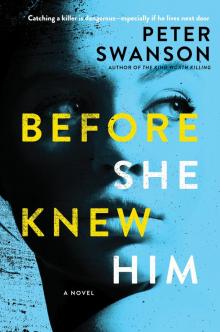 Before She Knew Him
Before She Knew Him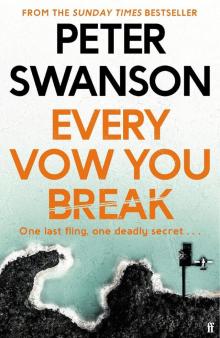 Every Vow You Break
Every Vow You Break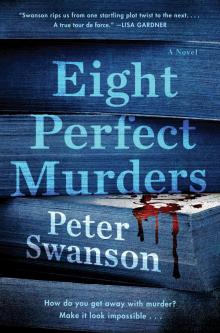 Eight Perfect Murders
Eight Perfect Murders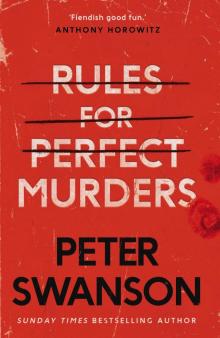 Rules for Perfect Murders
Rules for Perfect Murders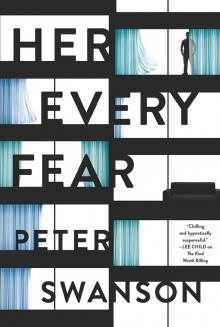 Her Every Fear
Her Every Fear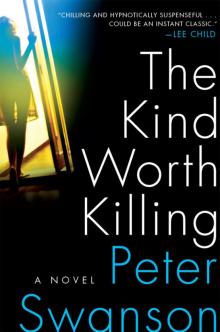 The Kind Worth Killing
The Kind Worth Killing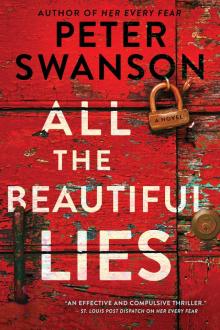 All the Beautiful Lies
All the Beautiful Lies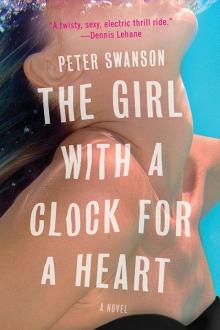 The Girl with a Clock for a Heart: A Novel
The Girl with a Clock for a Heart: A Novel